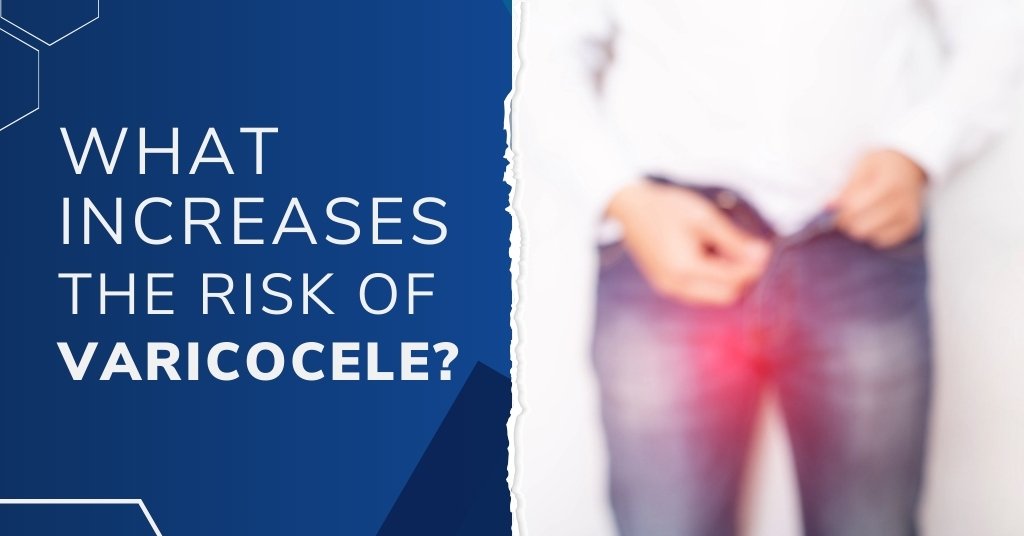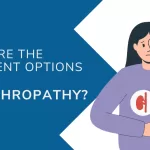What is varicocele?
A medical condition called varicocele is defined by vein enlargement in the scrotum, similar to varicose veins in the legs. It is mostly confined to the left side of the scrotum and is often the source of poor sperm count and low-quality sperm, both of which can result in infertility. Several factors can increase the risk of varicocele, including anatomical, genetic, lifestyle, and environmental, necessitating the understanding of risk factors for varicocele.
Anatomical Factors
- Venous Valve Malfunction: Varicoceles are often caused by malfunctioning valves within the veins of the spermatic cord, which prevent blood from flowing properly. This leads to blood pooling and vein enlargement. The malfunctioning of these valves is primarily an anatomical issue.
- Left-Sided Predominance: The left testicular vein empties into the left renal vein at a right angle, generating more pressure than the right testicular vein, which drains directly into the inferior vena cava. This anatomical difference explains why varicoceles are more common on the left side.
- Height and Body Mass Index (BMI): Taller men and those with a lower BMI have been found to have a higher risk of developing varicoceles. The reason for this is not entirely apparent but may be related to the gravitational effects on the venous blood flow in taller individuals.
Genetic Factors
- Family History: A family history of varicoceles or related conditions, such as varicose veins and haemorrhoids, can increase the likelihood of developing varicocele. Genetic predisposition can influence the strength and functionality of venous valves and the connective tissue structure of the veins.
- Congenital Factors: A few individuals may be born with a predisposition to developing varicocele due to congenital abnormalities in their venous anatomy or vein valve structure.
Lifestyle and Environmental Factors
- Physical Activity: Engaging in heavy physical activity, especially activities that involve significant lifting or straining, can increase abdominal pressure and disrupt normal blood flow, leading to the development of varicocele.
- Prolonged Standing or Sitting: Occupations or activities requiring long standing or sitting periods can contribute to venous pooling in the lower extremities and pelvis, increasing the risk of varicocele.
- Temperature and Climate: Heat can cause veins to dilate. Living in hot climates or being frequently exposed to high temperatures, such as in hot baths or saunas, may increase the risk of varicocele development.
Health Conditions
- Chronic Conditions: Conditions that increase intra-abdominal pressure, such as chronic constipation, chronic cough, or obesity, can lead to varicocele. Persistent straining associated with these conditions puts extra pressure on the venous system in the pelvic area.
- Kidney Tumors: Though rare, kidney tumours can block blood flow from the testicular vein, leading to secondary varicocele.
Age and Hormonal Factors
- Adolescence: Varicoceles often develop during puberty when the testicles undergo rapid growth and increased blood flow. The hormonal changes and physical development during this period can contribute to the condition’s onset.
- Testosterone Levels: Because testosterone affects blood flow dynamics in the scrotum and dilates blood vessels, it may be associated with the formation of varicocele.
Preventive Measures
- Healthy Lifestyle: Varicocele risk can be decreased by eating a healthy weight, exercising regularly and avoiding activities that put undue tension on the abdominal muscles.
- Regular Medical Check-Ups: Early detection through routine medical examinations can help manage varicocele before it leads to significant complications.
- Awareness and Education: Understanding the risk factors and symptoms associated with varicocele can lead to prompt medical attention and appropriate management.
Varicocele Diagnosis and Management
Diagnosing the causes of varicocele varicocele typically involves a physical examination, which may include an ultrasound to assess the veins within the scrotum. Treatment options vary depending on the disease’s severity and symptoms. In many cases, varicoceles are asymptomatic and do not require treatment. However, if pain, testicular atrophy, or infertility occurs, homeopathic interventions may be necessary to alleviate symptoms and improve fertility.
Homeopathic Treatment for Varicocele
Varicocele is a frequent disorder characterised by an expansion of the veins within the scrotum. It can cause discomfort, swelling, and infertility in certain situations. While conventional treatments include surgery and embolisation, some individuals seek alternative therapies like homeopathy. Homeopathy, a holistic system of medicine founded in the 18th century by Samuel Hahnemann, uses highly diluted substances to stimulate the body’s natural healing processes.
- Holistic Approach
Homeopathy adopts a holistic approach, meaning it considers the individual’s physical, emotional, and mental states when prescribing remedies. For varicocele, a homeopath will conduct a thorough assessment to understand the patient’s overall health, lifestyle, and any underlying conditions that may contribute to the problem. This individualised treatment plan aims to address the root cause of varicocele and enhance the body’s self-healing abilities.
- Lifestyle and Dietary Recommendations
Varicocele can be treated with homeopathic treatments and specific dietary and lifestyle modifications. Frequent exercise can be beneficial, mainly when it includes blood circulation-enhancing activities like yoga, swimming, and walking. A diet high in fibre, antioxidants, and anti-inflammatory foods such as nuts, fruits, vegetables, whole grains, and seeds can lessen venous congestion and enhance general vascular health.
Conclusion
While homeopathy remedy for varicocele provides symptomatic relief through a varicocele treatment without surgery, it is essential to consult a qualified homeopath physician for a personalized treatment plan. Combining homeopathic remedies with lifestyle modifications can enhance the effectiveness of the treatment and improve the quality of life for individuals with varicocele.
In conclusion, varicocele risk factors are multifaceted, involving anatomical, genetic, lifestyle, and environmental influences. Awareness and early detection are crucial for managing this condition effectively and mitigating its impact on fertility and overall health.


